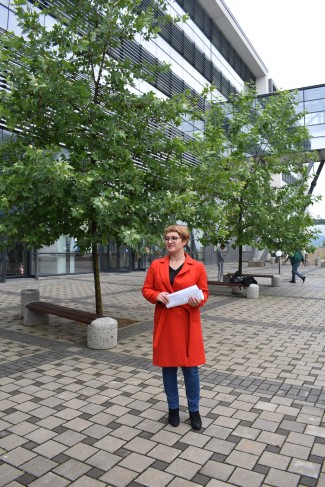On June 23, the Kosovo Police (KP) were sued for gender-based discrimination at the Basic Court of Prishtina, making it the first such public case since the establishment of the institutions.
Luljeta Aliu, the leader of an organization for equality and social justice, filed a discrimination lawsuit and requested compensation of nonmaterial damage worth 100,000 euros against the Ministry of Internal Affairs and five police officers.
According to the lawsuit, police officers refused to let Aliu file a complaint against her husband for violating a court-issued protective order after she reported him for domestic violence. The refusal was also supported by other police bodies tasked with addressing the complaints, on the grounds that the plaintiff was not appropriately dressed on the day she went to the police station police to register the complaint.
The lawsuit, a copy of which was obtained by K2.0, states that the court must “hold accountable the relevant institutions and officials involved in violating fundamental human rights.”
The Regional Police Directorate and the Complaints and Compensation Commission rejected Aliu’s complaint that the police refused to register the case on the grounds that she was wearing “an extremely short dress and a T-shirt with straps” when she appeared to file a complaint, and that she was asked to go change her clothing.
"The institutions have a culture of impunity and lack transparency."
Luljeta Aliu
To justify their decision, the police officers referred to the “Code of Ethics for the Dress Code of Officials and Parties in Official Institutions.” However, the lawsuit states that this document does not exist and that this was confirmed to Aliu and her lawyer in writing by the KP’s Information Office in May 2020.
The lawsuit alleges that the refusal to register the case on the grounds that Ali was wearing “an extremely short dress and a T-shirt with straps” constitutes gender discrimination.
“Gender discrimination is not dealt with here, and the institutions have a culture of impunity and lack transparency,” Aliu says. “When these are done along with the discrimination and prejudice they have, it is difficult to achieve the fulfillment of your rights.”

Luljeta Aliu challenged the police’s decisions in June 2019 by filing a lawsuit against the police for rejecting her complaint. Photo courtesy of Luljeta Aliu.
On the other hand, her legal representative, lawyer Rina Kika, says that the part of the lawsuit filed June 23 finds a series of violations that can be summarized into two main ones: Violation of equal treatment and violation of the right to a private and family life.
“Victims of domestic violence, according to the case law of the European Court of Human Rights (ECHR), are considered vulnerable victims and therefore the obligations to protect the private and family life of the state are special positive obligations,” Kika says. “The state must take concrete actions to protect the person from domestic violence, as it violates the mental and physical integrity of the person and therefore you cannot enjoy the right to privacy and live peacefully and without worries if you are already subject to that violence.”
The insistent request for responsibility
The lawsuit was attached to the June 2019 lawsuit for the administrative dispute, where Aliu challenged the decisions of the police to reject her complaint against an officer as unfounded.
In February 2017, she accused her husband of domestic violence and the Basic Court of Prishtina approved her request for a protective order.
A month later, Aliu went to the police station again, this time to report economic and psychological violence, which constitutes a violation of the protective order. While she was reporting the case, she sent an email to the police with the decision to issue a protective order.
But, according to the lawsuit, when the police officer learned her husband’s name, he refused to record the complaint, stating that “there is no violence now and there was none in the past” and ordered Aliu to leave the police station.
"Whenever a police officer is informed about a case of domestic violence against a woman and does not take steps to protect her from this violence, they are involved in unequal treatment."
Rina Kika
The lawsuit underlines that the KP must respond to any complaint about domestic violence or violation of a protection order and it must draft a report on the case regardless of whether the offense was committed or not.
Also, the lawsuit emphasizes the Standard Procedures for Action for the Investigation of Domestic Violence Cases says that “police officers take all measures for their execution,” and have an obligation “to act quickly, because this period of time is considered very dangerous for the victims” in cases when the implementation of the court decision is delayed.
Kika believes that this is the first instance of discrimination in Aliu’s case.
“Whenever a police officer is informed about a case of domestic violence against a woman and does not take steps to protect her from this violence, they are involved in unequal treatment,” Kika said. “This is because domestic violence affects women disproportionately or affects women because they are women, and as such is considered gender-based violence and discrimination. For this reason, it is believed that the refusal of measures for the protection of female victims of domestic violence is unequal treatment and condones gender-based violence by state institutions.

Lawyer Rina Kika says that there was double discrimination in Luljeta Aliu’s case. Photo: Majlinda Hoxha / K2.0.
Aliu submitted a complaint against the police officer at the Kosovo Police Inspectorate (KPI), which found that the officer did not commit a criminal offense and moved the case over to the Regional Directorate of Professional Standards of the KP for administrative review.
But the Regional Directorate rejected the complaint as unfounded, noting that the police officer had refused to take Aliu’s statement because she was wearing “an extremely short dress and a T-shirt with straps,” and that the case was not of an urgent nature. According to the directorate, the police officer asked Aliu to dress differently — referring to the “Code of Ethics for Dress Code for Officials and Parties in Official Institutions” — and then to “discuss” with police officials the case.
According to Kika, the second case of discrimination is found in this decision of the Regional Directorate because it refers to a nonexistent document.
“Even if this document had existed, we would have challenged it because it discriminates on the basis of gender,” she said. “They invented a document to deny a woman the ability to make a complaint about domestic violence.”
She explains that even according to the KP, the internal regulations of the police determine the rules for the dress of police personnel, but none of the documents that regulate the dress in the institution of the police determine the dress code of the injured parties — the victims.
To challenge the decision of the Regional Directorate, Aliu lodged a complaint with the Kosovo Police Complaints and Compensation Commission, listing all alleged negligent actions of KP officials. The complaint stated that it was not true that the police officer had removed her from the police station because of her dress, and that the description of her dress by the official and his statement that she had been told to come later were untrue.
However, the Commission, composed of three police officers, reiterated the approach of the first instance officials and rejected Aliu’s complaint.
Kika explained that their decision confirms that of the Regional Police Directorate, without referring whatsoever to the Law on Protection against Domestic Violence and is based on a nonexistent document on the dress of the parties in official institutions.
For Aliu, this treatment by police officials constitutes a complete denial of her rights.
“We have decided to demand individual responsibility from the police officers because we do not want them to get away without accountability,” she said. “If you have committed a drastic violation, as in Luljeta’s case, the court’s decision to punish the institution alone is not enough. We are requesting that specific people be held accountable for the decisions they have taken without reference to any provision of the Law on Protection against Domestic Violence or Standard Procedures applicable to cases of domestic violence.”
She requested access to the police file to obtain a copy of the original statement when Aliu had accused her husband, but the police failed to provide her with the document.
“We have a washed out copy from the Office for the Protection of Victims [within the State Prosecutor’s Office], so we have requested that a copy of the statement be provided to us by the police to prepare the case,” says Kika. “This shows negligent police behavior and unsatisfactory performance of duties from the beginning.”
For Aliu, this treatment by police officials constitutes a complete denial of her rights.
“These discriminatory decisions are about denying my access to justice,” Aliu said. “This is institutional discrimination by the police. They’re just repeating the excuse — they’re repeating the same lie, just to deny my complaint to the police.”
Her personal case of domestic violence has made Aliu a human rights activist. She hopes that this case will help many girls and women to come forward and denounce the discriminatory gender treatment that they are subjected to by the institutions, regardless of which one.
“That’s why I am making the case public, so that first of all more information and awareness is known about the steps we can take for such violations,” she says.K
Feature image courtesy of Rina Kika.



